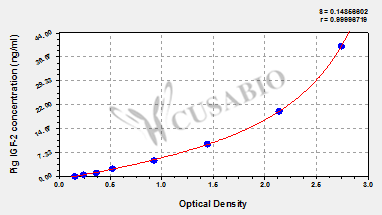Call us
301-363-4651 (Available 9 a.m. to 5 p.m. CST from Monday to Friday)
| Code | CSB-E06830p |
| Size | 96T,5×96T,10×96T |
| Price | Request a Quote |
| Trial Size |
24T ELISA Kit Trial Size (Only USD$150/ kit) * Sample kit cost can be deducted as a $30 credit for each 96-assay kit of the same analyte and brand you subsequently purchase within six months until depleted. More details >> Interested in a trial size? Please leave a message below.
|
| Have Questions? | Leave a Message or Start an on-line Chat |
| Intra-assay Precision (Precision within an assay): CV%<8% | |||||||
| Three samples of known concentration were tested twenty times on one plate to assess. | |||||||
| Inter-assay Precision (Precision between assays): CV%<10% | |||||||
| Three samples of known concentration were tested in twenty assays to assess. | |||||||
| To assess the linearity of the assay, samples were spiked with high concentrations of pig IGF-2 in various matrices and diluted with the Sample Diluent to produce samples with values within the dynamic range of the assay. | |||||||
| Sample | Serum(n=4) | ||||||
| 1:20 | Average % | 89 | |||||
| Range % | 83-97 | ||||||
| 1:40 | Average % | 94 | |||||
| Range % | 90-103 | ||||||
| 1:80 | Average % | 92 | |||||
| Range % | 86-100 | ||||||
| 1:160 | Average % | 93 | |||||
| Range % | 87-101 | ||||||
| The recovery of pig IGF-2 spiked to levels throughout the range of the assay in various matrices was evaluated. Samples were diluted prior to assay as directed in the Sample Preparation section. | |||||||
| Sample Type | Average % Recovery | Range | |||||
| Serum (n=5) | 97 | 91-105 | |||||
| EDTA plasma (n=4) | 95 | 89-105 | |||||
| These standard curves are provided for demonstration only. A standard curve should be generated for each set of samples assayed. | ||||||||||||||||||||||||||||||||||||||||||||||||||||||||||||||||||||||||

| ||||||||||||||||||||||||||||||||||||||||||||||||||||||||||||||||||||||||
This Pig IGF2 ELISA Kit was designed for the quantitative measurement of Pig IGF2 protein in serum, plasma. It is a Sandwich ELISA kit, its detection range is 0.625 ng/mL-40 ng/mL and the sensitivity is 0.156 ng/mL.
There are currently no reviews for this product.
KEGG: ssc:396916
UniGene: Ssc.9365